Unit 5 Do you have a soccer ball Section A(Grammar Focus-3c)课件(共36张PPT)
文档属性
| 名称 | Unit 5 Do you have a soccer ball Section A(Grammar Focus-3c)课件(共36张PPT) |  | |
| 格式 | zip | ||
| 文件大小 | 15.4MB | ||
| 资源类型 | 教案 | ||
| 版本资源 | 人教新目标(Go for it)版 | ||
| 科目 | 英语 | ||
| 更新时间 | 2021-09-17 23:49:02 | ||
图片预览

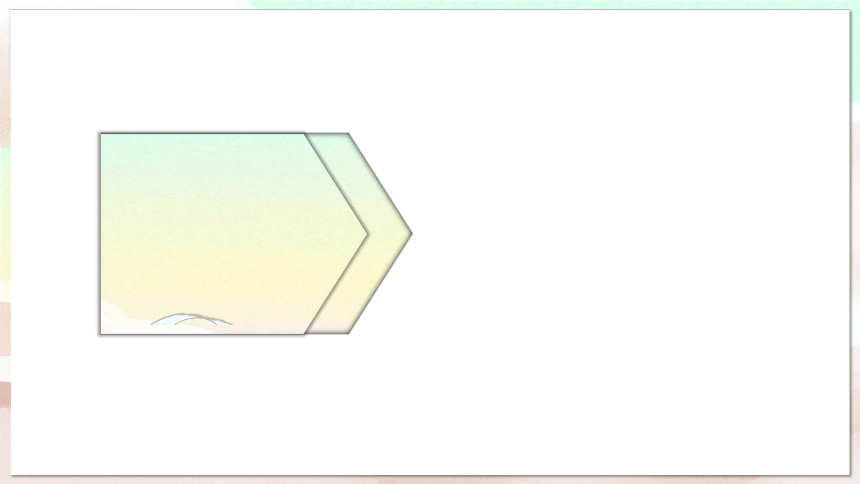
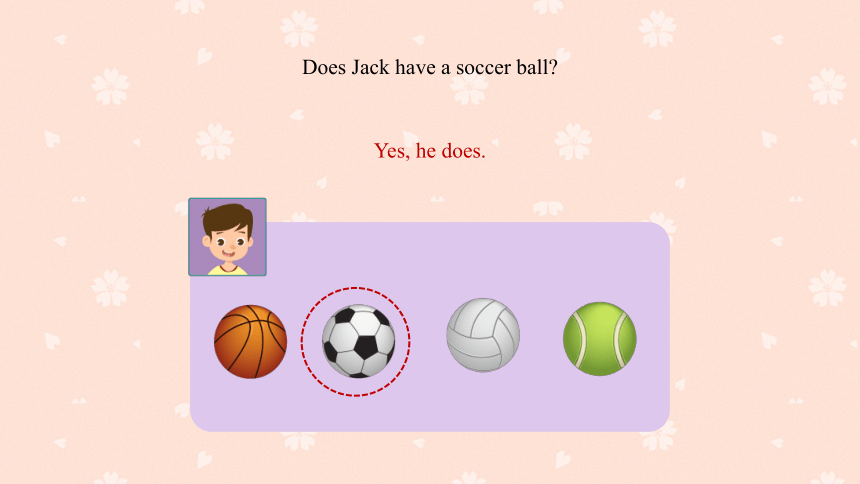
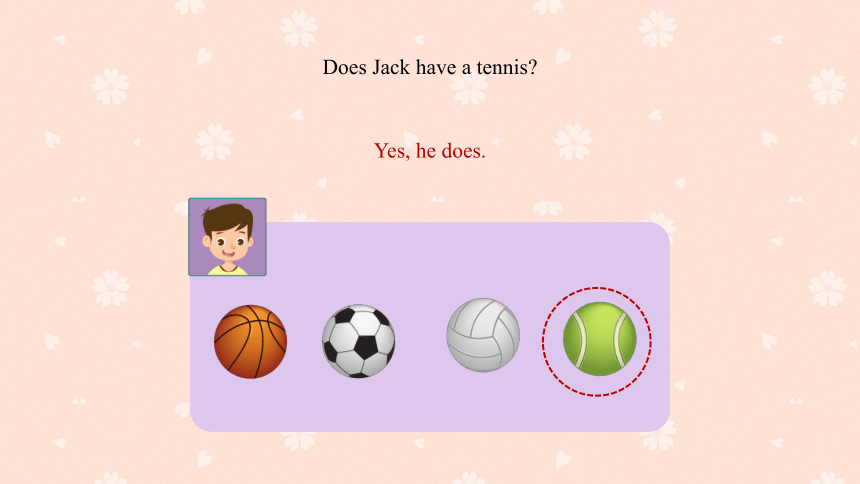
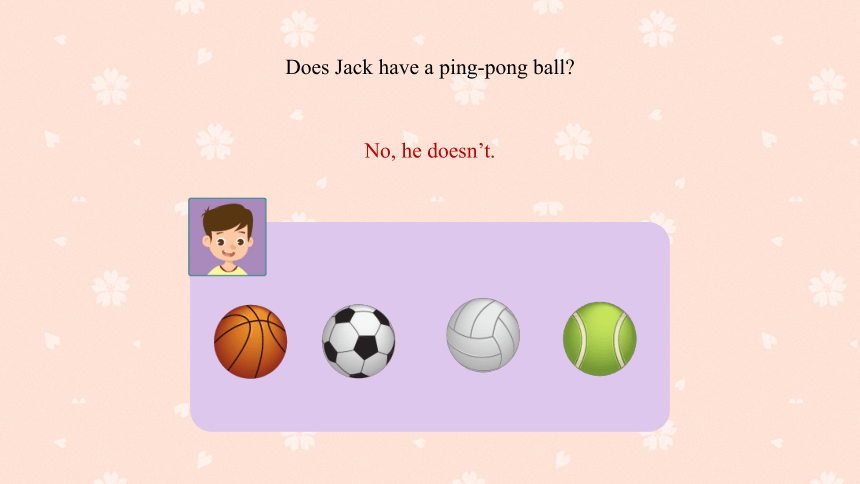
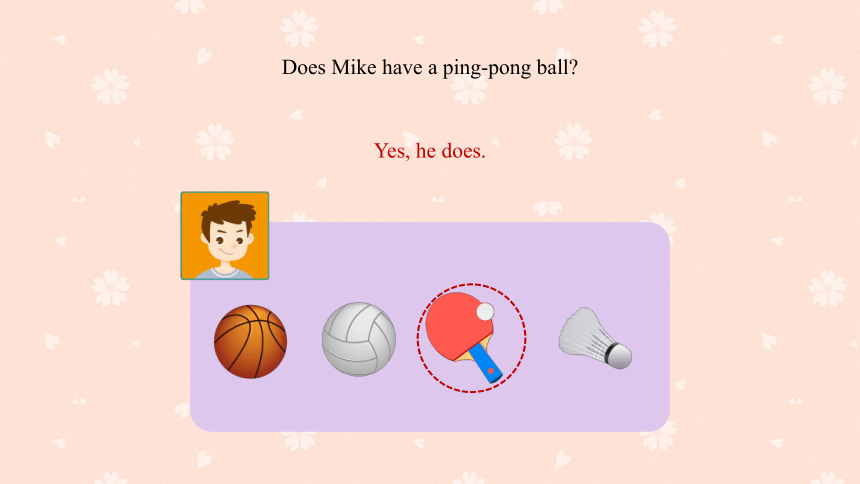
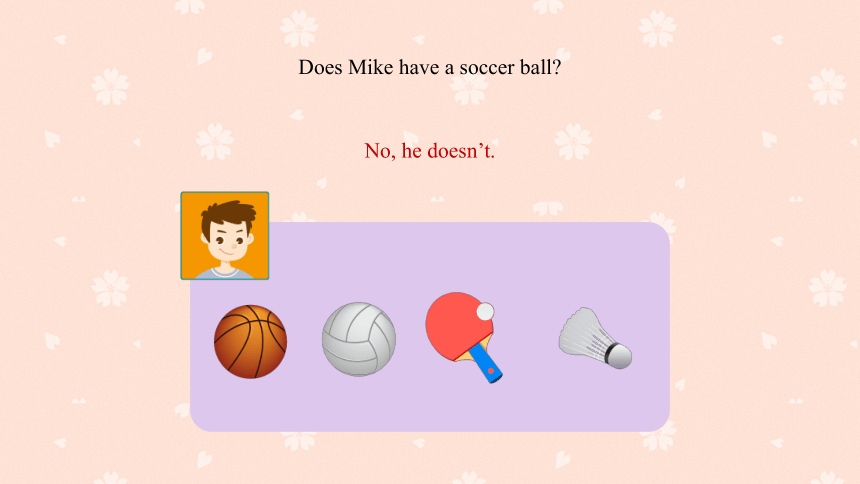
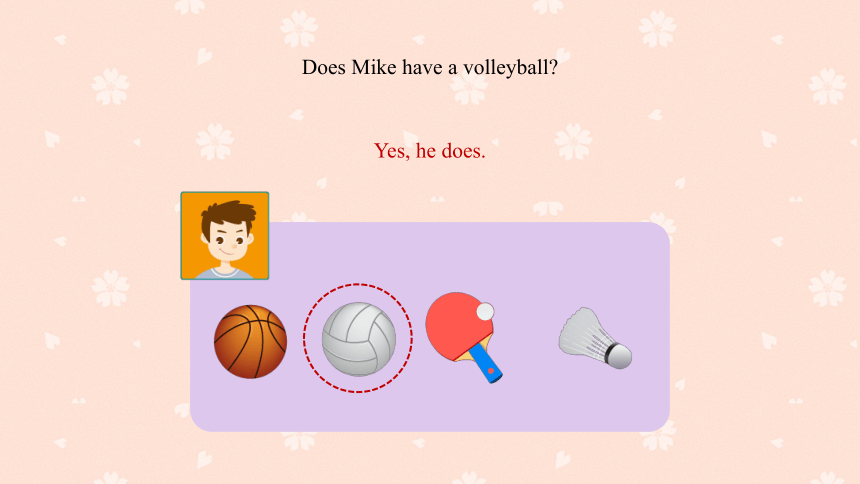
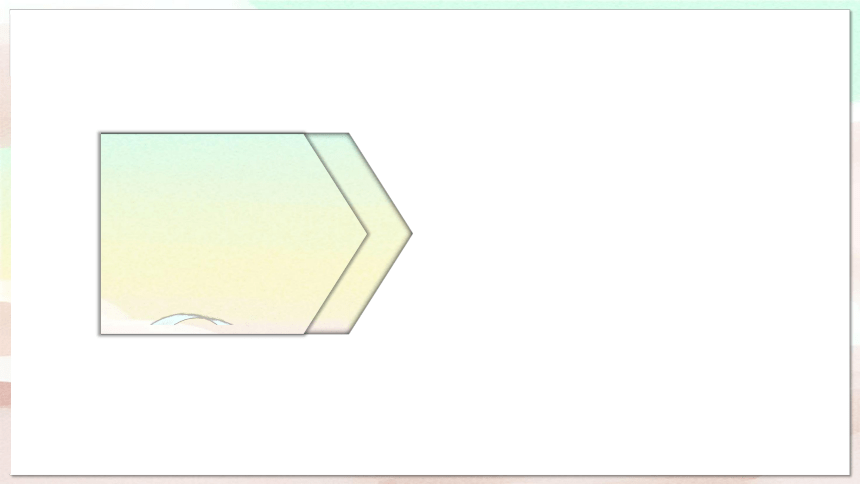

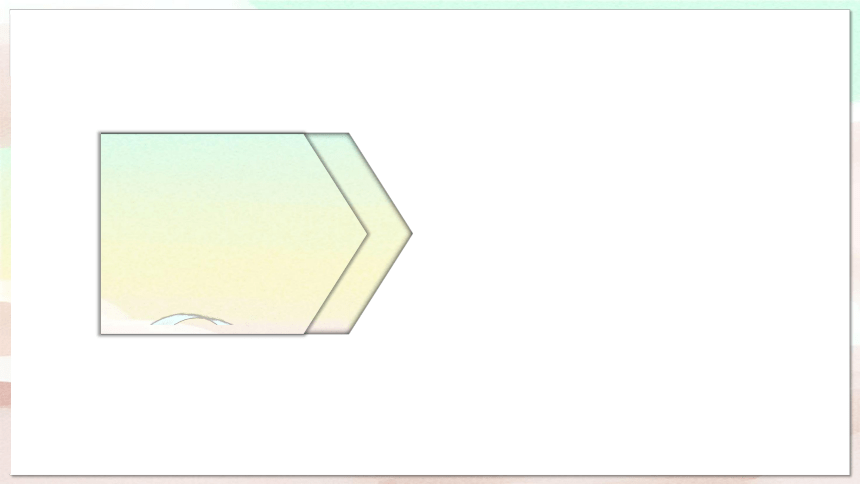
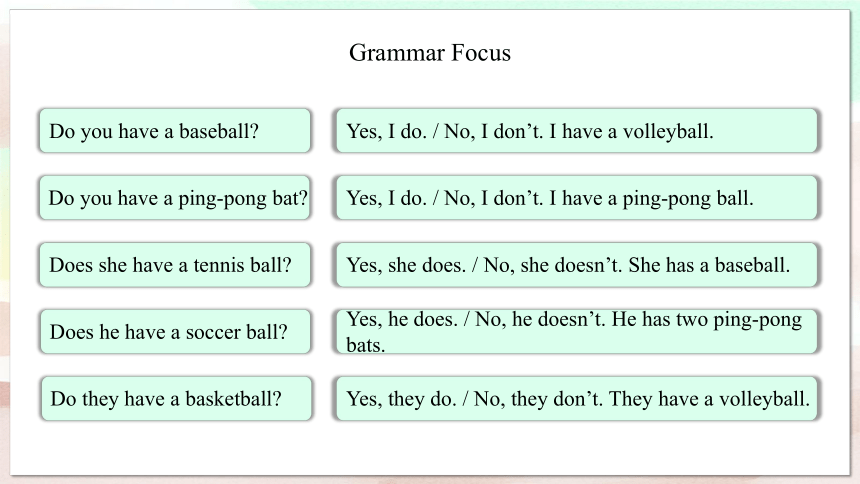
文档简介
(共36张PPT)
Unit
5
Do
you
have
a
soccer
ball?
Section
A
(1a-2d)
Lead-in
Does
Jack
have
a
soccer
ball?
Yes,
he
does.
Does
Jack
have
a
tennis?
Yes,
he
does.
Does
Jack
have
a
ping-pong
ball?
No,
he
doesn’t.
Does
Mike
have
a
ping-pong
ball?
Yes,
he
does.
Does
Mike
have
a
soccer
ball?
No,
he
doesn’t.
Does
Mike
have
a
volleyball?
Yes,
he
does.
Words
great
/greit/
adj.
美妙的;伟大的
play
/plei/
v.
参加(比赛或运动);玩耍
sound
/saund/
v.
听起来好像
Let’s
learn
Grammar
Focus
Do
you
have
a
baseball?
Do
you
have
a
ping-pong
bat?
Does
she
have
a
tennis
ball?
Does
he
have
a
soccer
ball?
Do
they
have
a
basketball?
Yes,
I
do.
/
No,
I
don’t.
I
have
a
volleyball.
Yes,
I
do.
/
No,
I
don’t.
I
have
a
ping-pong
ball.
Yes,
she
does.
/
No,
she
doesn’t.
She
has
a
baseball.
Yes,
he
does.
/
No,
he
doesn’t.
He
has
two
ping-pong
bats.
Yes,
they
do.
/
No,
they
don’t.
They
have
a
volleyball.
Pay
attention
to
these
grammar
points.
have
/
has的用法
肯定句
谓语动词
谓语动词have在句中有两种形式,即have和has。
have用于第一人称
(I,
we),
第二人称
(you),
以及第三人称复数
(they)或其他复数名词等后;
has用于第三人称单数(he,she,it或单数名词)后。
Pay
attention
to
these
grammar
points.
have
/
has的用法
否定句
变否定句时,需要借助助动词do或
does
的否定形式。
主语为非第三人称单数时,
句型为:
主语+don’t
have...
主语为第三人称单数时,
句型为:
主语+doesn’t
have...
Pay
attention
to
these
grammar
points.
一般疑问句
变一般疑问句时,也需要借助助动词do及其第三人称单数形式does。
主语为非第三人称单数时,句型为:Do+主语+have...?
主语为第三人称单数时,句型为:Does+主语+have...?
肯定回答:
Yes,
主语+do
/
does.
否定回答:
No,
主语+don’t
/
doesn’t.
Write
each
word
in
the
correct
place
in
the
chart.
I
he
they
you
we
she
it
Eric
do
does
I
he
they
you
we
she
it
Eric
They
a
basketball.
has
have
have
Tom
a
soccer
ball.
has
have
has
you
have
a
volleyball?
Does
Do
Do
he
have
a
ping-pong
bat?
Does
Do
Does
Fill
in
the
blanks
with
do
or
does.
A:
you
have
a
baseball?
B:
Yes,
I
.
A:
Great!
I
have
a
bat.
Let’s
play!
Do
do
A:
_______
John
have
a
soccer
ball?
B:
No,
he
_______.
A:
_______
he
have
a
ping-pong
bat?
B:
Yes,
he
_______.
I
think
he
has
a
ping-pong
ball,
too.
A:
Hmm…let’s
ask.
Does
doesn’t
Does
does
Fill
in
the
blanks
with
do
or
does.
A:
_____
your
friends
have
a
basketball?
B:
Yes,
they
______
.
They
have
two
basketballs.
A:
Well,
let’s
play
basketball.
B:
That
sounds
good.
Do
do
Fill
in
the
blanks
with
do
or
does.
Practice
the
conversations
with
your
partner.
Remember
the
things
in
Bob’s
room.
Close
your
books.
Then
ask
and
answer
questions
with
a
partner.
Remember
the
things
in
Bob’s
room.
Close
your
books.
Then
ask
and
answer
questions
with
a
partner.
Example:
A:
Does
Bob
have
a
soccer
ball?
B:
Yes,
he
does.
A:
Does
Bob
have
a
basketball?
B:
Yes,
he
does.
Pay
attention
to
these
language
points.
Do
you
have
a
ping-pong
ball?
这是一个一般现在时行为动词(do)的一般疑问句,
其中have是实义动词,
表示“某人拥有”。
句中do为助动词,
没有实际意义,
只是帮助构成句式。
Pay
attention
to
these
language
points.
Do
you
have
a
ping-pong
ball?
Yes,
I
do.
这是个肯定的简略回答形式。
其中do为动词,
用来避免动词的重复。
No.
I
don’t.
这是个否定的简略回答形式,
其中don’t
是do和not的缩写形式。
Pay
attention
to
these
language
points.
Let’s
play
soccer.
本句是以let开头的祈使句,
结构为“Let’s
do
sth.”,
意为
“咱们……吧”,常用于提出建议。句中的动词用原形。
Pay
attention
to
these
language
points.
That
sounds
good.
句中的sound为系动词,
其后接形容词good
作表语。
当主语是第三人称单数时,
在一般现
在时的肯定
句中,
动词后要加s,
构成动词的第三人称单数形式。
Let’s
practice
根据句意及首字母提示补全单词。
1.
My
brother
is
always
l
for
school.
2.—L
me
help
you.
—Thanks.
3.
I
t
Jack
is
at
school.
4.
That
s
good.
5.
I
have
a
basketball.
What
a
you?
ate
et
hink
ounds
bout
单项选择
(
)
1.I
have
_______basketball.
Let’s
play
_______basketball.
A.
/;
/
B.
a;
the
C.
a;
/
D.
/;
the
(
)
2.
—______
your
father
have
a
car?
—Yes,
he
______.
A.
Does;
do
B.
Do;
does
C.
Does;
does
D.is;
is
(
)
3.—Let’s
________
computer
games.
—No,
that
sounds
boring.
A.
to
play
B.
play
C.
playing
D.
plays
C
C
B
单项选择
(
)
4.—Can
you
play
football?
—__________
It’s
easy
(容易的).
A.
No,
I
can’t.
B.
Yes,
I
can.
C.
Sorry,
I
can’t.
D.
Yes,
I
do.
(
)
5.Lang
Ping
is
a
__________coach
(教练).
She
leads
the
Chinese
women’s
volleyball
team
to
the
world
championship
(冠军).
A.
volleyball
B.
football
C.
ping-pong
B
A
根据汉语完成句子,每空一词。
1.迈克有七个乒乓球拍。
Mike
seven
.
2.约翰有哥哥吗?
John
a
brother?
3.你有足球吗?
you
a
soccer
ball?
4.莉莉上学迟到了。
Lily
late
for
school.
5.让我去拿你的手表吧。
me
your
watch.
has
ping-pong
bats
Does
have
Do
have
is
late
Let
get
再见
Unit
5
Do
you
have
a
soccer
ball?
Section
A
(1a-2d)
Lead-in
Does
Jack
have
a
soccer
ball?
Yes,
he
does.
Does
Jack
have
a
tennis?
Yes,
he
does.
Does
Jack
have
a
ping-pong
ball?
No,
he
doesn’t.
Does
Mike
have
a
ping-pong
ball?
Yes,
he
does.
Does
Mike
have
a
soccer
ball?
No,
he
doesn’t.
Does
Mike
have
a
volleyball?
Yes,
he
does.
Words
great
/greit/
adj.
美妙的;伟大的
play
/plei/
v.
参加(比赛或运动);玩耍
sound
/saund/
v.
听起来好像
Let’s
learn
Grammar
Focus
Do
you
have
a
baseball?
Do
you
have
a
ping-pong
bat?
Does
she
have
a
tennis
ball?
Does
he
have
a
soccer
ball?
Do
they
have
a
basketball?
Yes,
I
do.
/
No,
I
don’t.
I
have
a
volleyball.
Yes,
I
do.
/
No,
I
don’t.
I
have
a
ping-pong
ball.
Yes,
she
does.
/
No,
she
doesn’t.
She
has
a
baseball.
Yes,
he
does.
/
No,
he
doesn’t.
He
has
two
ping-pong
bats.
Yes,
they
do.
/
No,
they
don’t.
They
have
a
volleyball.
Pay
attention
to
these
grammar
points.
have
/
has的用法
肯定句
谓语动词
谓语动词have在句中有两种形式,即have和has。
have用于第一人称
(I,
we),
第二人称
(you),
以及第三人称复数
(they)或其他复数名词等后;
has用于第三人称单数(he,she,it或单数名词)后。
Pay
attention
to
these
grammar
points.
have
/
has的用法
否定句
变否定句时,需要借助助动词do或
does
的否定形式。
主语为非第三人称单数时,
句型为:
主语+don’t
have...
主语为第三人称单数时,
句型为:
主语+doesn’t
have...
Pay
attention
to
these
grammar
points.
一般疑问句
变一般疑问句时,也需要借助助动词do及其第三人称单数形式does。
主语为非第三人称单数时,句型为:Do+主语+have...?
主语为第三人称单数时,句型为:Does+主语+have...?
肯定回答:
Yes,
主语+do
/
does.
否定回答:
No,
主语+don’t
/
doesn’t.
Write
each
word
in
the
correct
place
in
the
chart.
I
he
they
you
we
she
it
Eric
do
does
I
he
they
you
we
she
it
Eric
They
a
basketball.
has
have
have
Tom
a
soccer
ball.
has
have
has
you
have
a
volleyball?
Does
Do
Do
he
have
a
ping-pong
bat?
Does
Do
Does
Fill
in
the
blanks
with
do
or
does.
A:
you
have
a
baseball?
B:
Yes,
I
.
A:
Great!
I
have
a
bat.
Let’s
play!
Do
do
A:
_______
John
have
a
soccer
ball?
B:
No,
he
_______.
A:
_______
he
have
a
ping-pong
bat?
B:
Yes,
he
_______.
I
think
he
has
a
ping-pong
ball,
too.
A:
Hmm…let’s
ask.
Does
doesn’t
Does
does
Fill
in
the
blanks
with
do
or
does.
A:
_____
your
friends
have
a
basketball?
B:
Yes,
they
______
.
They
have
two
basketballs.
A:
Well,
let’s
play
basketball.
B:
That
sounds
good.
Do
do
Fill
in
the
blanks
with
do
or
does.
Practice
the
conversations
with
your
partner.
Remember
the
things
in
Bob’s
room.
Close
your
books.
Then
ask
and
answer
questions
with
a
partner.
Remember
the
things
in
Bob’s
room.
Close
your
books.
Then
ask
and
answer
questions
with
a
partner.
Example:
A:
Does
Bob
have
a
soccer
ball?
B:
Yes,
he
does.
A:
Does
Bob
have
a
basketball?
B:
Yes,
he
does.
Pay
attention
to
these
language
points.
Do
you
have
a
ping-pong
ball?
这是一个一般现在时行为动词(do)的一般疑问句,
其中have是实义动词,
表示“某人拥有”。
句中do为助动词,
没有实际意义,
只是帮助构成句式。
Pay
attention
to
these
language
points.
Do
you
have
a
ping-pong
ball?
Yes,
I
do.
这是个肯定的简略回答形式。
其中do为动词,
用来避免动词的重复。
No.
I
don’t.
这是个否定的简略回答形式,
其中don’t
是do和not的缩写形式。
Pay
attention
to
these
language
points.
Let’s
play
soccer.
本句是以let开头的祈使句,
结构为“Let’s
do
sth.”,
意为
“咱们……吧”,常用于提出建议。句中的动词用原形。
Pay
attention
to
these
language
points.
That
sounds
good.
句中的sound为系动词,
其后接形容词good
作表语。
当主语是第三人称单数时,
在一般现
在时的肯定
句中,
动词后要加s,
构成动词的第三人称单数形式。
Let’s
practice
根据句意及首字母提示补全单词。
1.
My
brother
is
always
l
for
school.
2.—L
me
help
you.
—Thanks.
3.
I
t
Jack
is
at
school.
4.
That
s
good.
5.
I
have
a
basketball.
What
a
you?
ate
et
hink
ounds
bout
单项选择
(
)
1.I
have
_______basketball.
Let’s
play
_______basketball.
A.
/;
/
B.
a;
the
C.
a;
/
D.
/;
the
(
)
2.
—______
your
father
have
a
car?
—Yes,
he
______.
A.
Does;
do
B.
Do;
does
C.
Does;
does
D.is;
is
(
)
3.—Let’s
________
computer
games.
—No,
that
sounds
boring.
A.
to
play
B.
play
C.
playing
D.
plays
C
C
B
单项选择
(
)
4.—Can
you
play
football?
—__________
It’s
easy
(容易的).
A.
No,
I
can’t.
B.
Yes,
I
can.
C.
Sorry,
I
can’t.
D.
Yes,
I
do.
(
)
5.Lang
Ping
is
a
__________coach
(教练).
She
leads
the
Chinese
women’s
volleyball
team
to
the
world
championship
(冠军).
A.
volleyball
B.
football
C.
ping-pong
B
A
根据汉语完成句子,每空一词。
1.迈克有七个乒乓球拍。
Mike
seven
.
2.约翰有哥哥吗?
John
a
brother?
3.你有足球吗?
you
a
soccer
ball?
4.莉莉上学迟到了。
Lily
late
for
school.
5.让我去拿你的手表吧。
me
your
watch.
has
ping-pong
bats
Does
have
Do
have
is
late
Let
get
再见
同课章节目录
- starters 预备篇(2012秋审查)
- Unit 1 Good morning !
- Unit 2 What’s this in English?
- Unit 3 What color is it ?
- Unit 1 My name's Gina.
- Section A
- Section B
- Unit 2 This is my sister.
- Section A
- Section B
- Unit 3 Is this your pencil?
- Section A
- Section B
- Unit 4 Where's my schoolbag?
- Section A
- Section B
- Unit 5 Do you have a soccer ball?
- Section A
- Section B
- Unit 6 Do you like bananas?
- Section A
- Section B
- Unit 7 How much are these socks?
- Section A
- Section B
- Unit 8 When is your birthday?
- Section A
- Section B
- Unit 9 My favorite subject is science.
- Section A
- Section B
